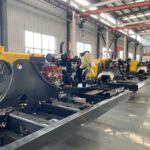Table of Contents
- Introduction
- The Importance of Large Wheel Loaders
- Key Features of Large Wheel Loaders
- Applications of Large Wheel Loaders
- Benefits of Using Large Wheel Loaders
- Factors to Consider When Choosing a Large Wheel Loader
- Maintenance and Safety Tips for Large Wheel Loaders
- The Future of Large Wheel Loaders
- Conclusion
- FAQs
Introduction
Large wheel loaders play a vital role in various industries, from construction and mining to agriculture and forestry. These powerful machines are designed to handle heavy loads, making them essential for efficient material handling and earthmoving operations. In this article, we will explore the significance of large wheel loaders, their key features, applications, benefits, factors to consider when choosing one, maintenance and safety tips, and the future of these impressive machines.
The Importance of Large Wheel Loaders

The importance of wheel loaders cannot be overstated when it comes to various industries that rely on efficient material handling and earthmoving operations. These powerful machines play a vital role in ensuring productivity, safety, and cost-effectiveness in sectors such as construction, mining, agriculture, and forestry. Let’s delve deeper into why large wheel loaders are so crucial in these industries.
First and foremost, wheel loaders are capable of handling heavy loads with ease. They have a high load capacity, allowing them to carry substantial amounts of materials in a single scoop. This efficiency significantly reduces the time and effort required for loading and transporting tasks. By streamlining material handling processes, large wheel loaders contribute to increased efficiency and productivity on construction sites, mining operations, and other industrial settings.
Furthermore, wheel loaders offer versatility and adaptability. They come with interchangeable attachments such as buckets, forks, and grapples, which enable them to perform a wide range of tasks. Whether it’s loading and unloading materials, lifting heavy objects, or sorting materials, large wheel loaders can handle diverse applications. This versatility eliminates the need for multiple specialized machines, resulting in cost savings and streamlined operations.
Another significant advantage of wheel loaders is their powerful engines. These machines are equipped with engines that provide ample torque and horsepower to tackle demanding tasks. The engines are designed for efficiency and durability, ensuring optimal performance even in challenging working conditions. With their robust engines, large wheel loaders can easily navigate rough terrains and handle heavy materials without compromising on productivity or safety.
Key Features of Large Wheel Loaders
Large wheel loaders are equipped with several features that contribute to their exceptional performance. Some of the key features include:
High Load Capacity
Wheel loaders are designed to handle heavy loads. They have a high load capacity, allowing them to carry substantial amounts of material in a single scoop.
Powerful Engine
These machines are equipped with powerful engines that provide the necessary torque and horsepower to handle demanding tasks. The engines are designed for efficiency and durability, ensuring optimal performance in various working conditions.
Versatility
Wheel loaders come with interchangeable attachments, such as buckets, forks, and grapples, which enhance their versatility. These attachments enable the loaders to perform a wide range of tasks, including loading, lifting, and sorting materials.
Advanced Controls and Technology
Modern wheel loaders feature advanced control systems and technology that improve operator comfort, safety, and efficiency. Features like joystick controls, ergonomic cabs, and integrated monitoring systems enhance the overall operational experience.
Applications of Large Wheel Loaders
Wheel loaders find extensive applications across multiple industries. Some common applications include:
Construction Sites
Wheel loaders are used in construction sites for various tasks, such as loading and transporting construction materials, backfilling trenches, and clearing debris.
Mining Operations
In the mining industry, large wheel loaders are utilized to move large quantities of ore, coal, and other minerals. They are essential for loading trucks and feeding materials into crushers and conveyors.
Agriculture and Forestry
Wheel loaders are employed in agricultural and forestry operations for tasks like handling crops, moving feed, and loading timber. They are particularly useful in large-scale farming and logging operations.
Benefits of Using Large Wheel Loaders
Using wheel loaders offers several benefits to industries and businesses:
Increased Efficiency
Wheel loaders can handle significant loads, reducing the time and effort required for material handling tasks. This leads to improved productivity and overall operational efficiency.
Versatile and Adaptable
The interchangeable attachments available for wheel loaders make them highly versatile. They can perform various tasks, eliminating the need for multiple specialized machines.
Enhanced Safety
Modern7654313 d wheel loaders are equipped with safety features such as backup cameras, proximity sensors, and automatic braking systems. These features help prevent accidents and protect both operators and bystanders.
Cost Savings
By streamlining material handling operations, large wheel loaders help reduce labor costs and increase cost-effectiveness. Their efficiency and versatility contribute to overall savings in the long run.
Factors to Consider When Choosing a Large Wheel Loader
When selecting a large wheel loader for your specific needs, it’s essential to consider the following factors:
Load Capacity
Evaluate the load capacity required for your operations to ensure the selected wheel loader can handle the anticipated loads efficiently.
Engine Power and Fuel Efficiency
Consider the power and fuel efficiency of the wheel loader’s engine. Opt for a machine that balances performance with fuel economy to minimize operational costs.
Attachments and Versatility
Assess the available attachments and their compatibility with your intended applications. Choose a large wheel loader that can accommodate a range of attachments for maximum versatility.
Operator Comfort and Safety Features
Look for features that prioritize operator comfort, such as ergonomic cabs, adjustable seats, and user-friendly controls. Additionally, consider safety features like visibility enhancements and integrated monitoring systems.
Maintenance and Safety Tips for Large Wheel Loaders

To ensure optimal performance and safety while using wheel loaders, follow these maintenance and safety tips:
- Regularly inspect the machine for any signs of wear, damage, or fluid leaks. Address any issues promptly to prevent further damage.
- Adhere to the manufacturer’s recommended maintenance schedule for routine service, such as oil changes, filter replacements, and lubrication.
- Keep the tires properly inflated to maintain stability and prevent excessive wear.
- Train operators on safe operating procedures, including proper use of attachments, load capacity limits, and awareness of their surroundings.
- Implement a comprehensive safety program that includes regular training, hazard assessments, and equipment-specific protocols.
The Future of Large Wheel Loaders
As technology advances, the future of wheel loaders looks promising. Some potential developments include:
- Increased automation: Automation technologies may be integrated into large wheel loaders, allowing for autonomous operation in certain environments.
- Improved fuel efficiency: Manufacturers will continue to enhance engine technology and explore alternative power sources to improve fuel efficiency and reduce emissions.
- Enhanced connectivity: Large wheel loaders may feature advanced connectivity options, enabling real-time monitoring, remote diagnostics, and predictive maintenance.
Conclusion
Wheel loaders are invaluable machines in industries that rely on efficient material handling and earthmoving. Their high load capacity, versatility, and advanced features contribute to increased productivity, cost savings, and improved safety. By considering key factors when selecting a wheel loader and implementing proper maintenance and safety measures, businesses can harness the full potential of these powerful machines.
FAQs
- What is the maximum load capacity of a large wheel loader?
The maximum load capacity of a large wheel loader can vary depending on the model and manufacturer. It typically ranges from 15 to 60 tons or more. - Are large wheel loaders difficult to operate?
While wheel loaders require training and experience to operate efficiently, modern models come with user-friendly controls and ergonomic features that enhance operator comfort and ease of use. - Can large wheel loaders work in rough terrain?
Yes, wheel loaders are designed to handle various terrains, including rough and uneven surfaces. They have robust suspension systems and durable tires that provide stability and traction. - What is the lifespan of a large wheel loader?
The lifespan of a wheel loader depends on several factors, such as usage, maintenance, and operating conditions. With proper care and maintenance, these machines can last for many years. - Can large wheel loaders be used in snow removal operations?
Yes, wheel loaders can be equipped with snow removal attachments, such as snow blades or snow blowers, to effectively clear snow from roads, parking lots, and other areas.






-150x150.webp)
